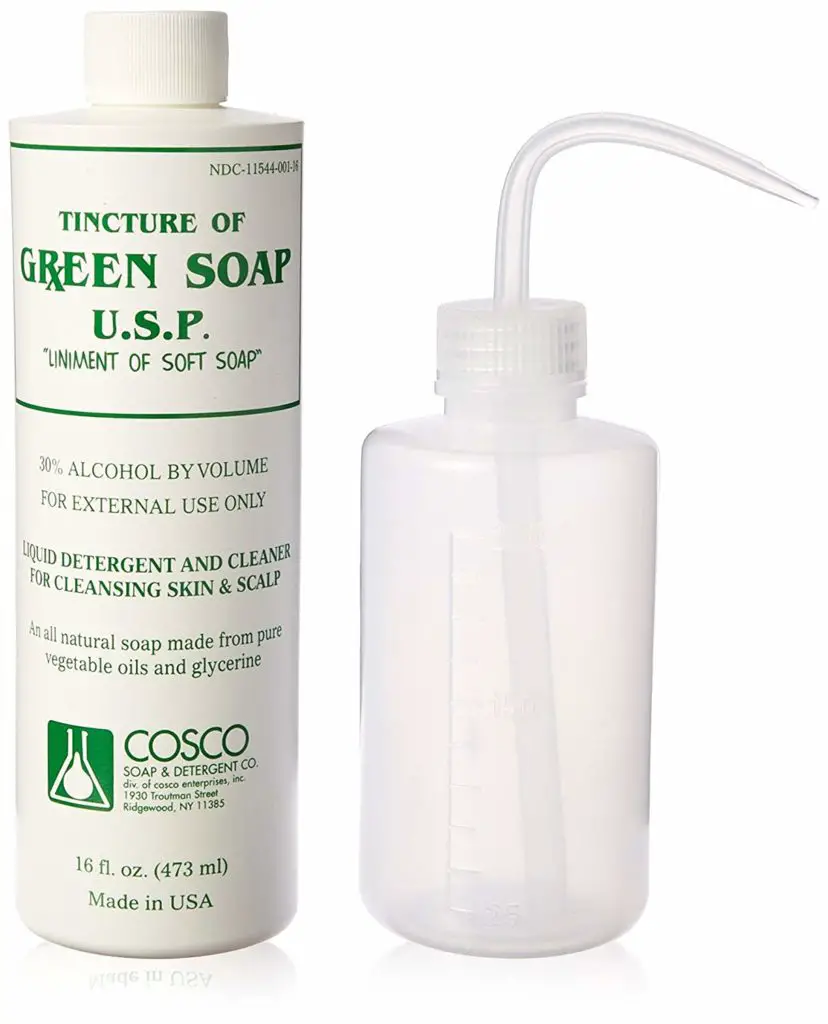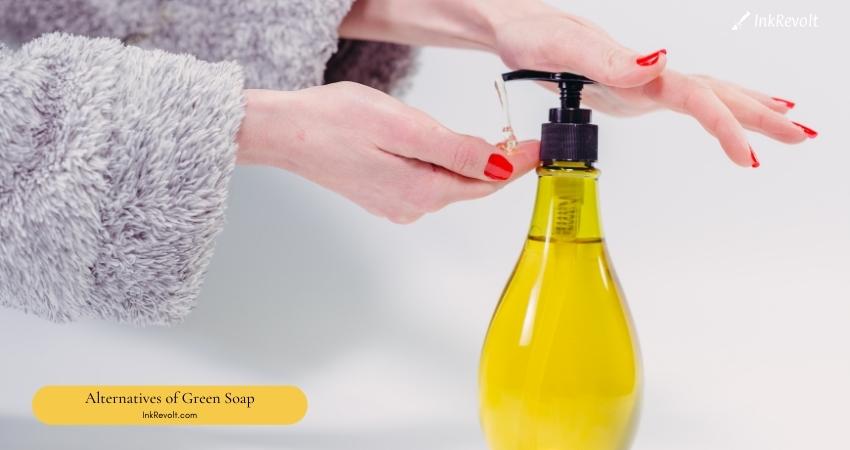What Can I Use Instead of Green Soap for Tattooing?
When it comes to tattooing, using the right products and equipment is crucial for achieving high-quality and safe results. One product that has been a staple in the tattoo industry for many years is green soap.
But the question that might come up is, “What can I use instead of green soap for tattooing?”
There are several options available as alternatives to green soap for tattooing, including isopropyl alcohol, sterile saline solution, antimicrobial foam or spray, and Castile soap. It’s important to choose a safe and effective substitute that is free from harsh and harmful ingredients.
In this article, we will explore alternative products that can be used instead of green soap for tattooing. Whether you are a professional tattoo artist or a client looking to get a tattoo, this article will help you make an informed decision about the products used in the tattooing process.
Is Green Soap Necessary for Tattoos?
Although Green soap is a common product used in the tattoo industry for cleaning the skin before and during the tattooing process, it is not mandatory for tattoos.

It has become common practice to use green soap to clean and ready the skin for tattooing. It’s a gentle soap that yet does a good job of cleaning the skin of debris, oil, and germs before tattooing.
Cleaning and disinfecting the skin may also be done without the use of water by using an antimicrobial foam or spray. Although certain green soaps may be more effective than others, it’s still crucial to do your research.
It is vital to select a mild, fragrance-free soap that is appropriate for use on the skin, and there are other safe and effective choices for prepping the skin.
Ingredients of Green Soap vs Regular Soap
Many people confuse Green soap with regular soap, but they couldn’t have been wrong. Green soap and regular soap differ in their ingredients and formulations. Here are the main differences between the two:
Green soap
Green soap, also known as surgical soap, is a liquid soap that is commonly used in medical settings and the tattoo industry. The primary ingredients in green soap include:
- Potassium hydroxide: This is a strong alkaline compound that is used to saponify the other ingredients in the soap, creating a soap base.
- Vegetable oils: These are usually derived from soybean, coconut, or palm oils, and they provide the soap with its cleansing and moisturizing properties.
- Glycerin: This is a natural byproduct of the soap-making process and is known for its moisturizing properties.
- Alcohol: This is often added to green soap to help sterilize the skin and equipment during the tattooing process.
- Water: This is used as a diluent to create a liquid soap.
Regular soap
Regular soap, or non-medicated soap, is a type of soap that is commonly used for everyday hygiene purposes. The ingredients in regular soap vary depending on the brand and formulation, but they typically include:
- Sodium hydroxide or potassium hydroxide: These are strong alkaline compounds that are used to saponify the other ingredients in the soap.
- Fatty acids: These are usually derived from animal or vegetable sources and provide the soap with its cleansing properties.
- Fragrances, dyes, and other additives: These are often added to regular soap to improve its scent, appearance, or texture.
Overall, the main difference between green soap and regular soap is that green soap typically contains more natural and skin-friendly ingredients, while regular soap may contain additional additives that are not necessary for tattooing.
Let’s summarize the differences at the table below:
| Ingredients | Green Soap | Regular Soap |
| Alkaline compound | Potassium hydroxide | Sodium hydroxide or potassium hydroxide |
| Oils | Usually vegetable oils (e.g. soybean, coconut, or palm oil) | Usually fatty acids from animal or vegetable sources |
| Glycerin | Yes | No |
| Alcohol | Yes (for sterilization purposes) | No |
| Fragrances | No | Yes |
| Dyes | No | Yes |
What Are The Alternatives of Green Soap?

There are a few alternatives to using green soap, which is a common option for cleansing and prepping the skin before and during the tattooing process. The following are some of the most popular substitutions for green soap:
Isopropyl alcohol
This is a typical cleaner and disinfectant that works well to get rid of bacteria, oil, and grime from the skin. It is crucial to dilute the alcohol with water and to keep it away from skin that is damaged or sensitive.
Sterile saline solution
This is a well-liked option, particularly for people with sensitive skin. It is a mild solution that thoroughly cleans and disinfects the skin without irritating or harming it.
Antimicrobial foam or spray
Without using water, these items can be used to thoroughly clean and disinfect the skin. For people who have sensitive skin or who need to clean their skin on the go, they can be an excellent solution.
Castile soap
This mild soap made from plants can be used to tattoos. It’s crucial to use a mild, fragrance-free version of this soap to prevent skin irritation.
Fragrance-free soap
Cleaning and prepping the skin for tattooing can be done with a mild, unscented soap that is made for sensitive skin. Choose a soap that doesn’t have any abrasive cleaning ingredients, strong scents, or other irritants that could harm the skin or have unfavorable effects.
Witch hazel
This all-natural astringent, which can be used both before and after tattooing, is made from the witch hazel plant’s bark and leaves. Witch hazel must be diluted with water and should not be applied to injured or irritated skin.
Baby wipes
Baby wipes that are unscented and alcohol-free might be a practical and gentle solution for washing the skin before getting a tattoo. However, they might not be as successful in removing grime, oil, and bacteria from the skin as other options.
It’s crucial to make sure that whichever substitute you select is risk-free, efficient, and free from side effects when applied to the skin. Keep your tattoo clean and well-maintained by adhering to the aftercare recommendations that your tattoo artist has provided.
How to Choose the right Soap for you tattoos

In order to keep your ink looking fresh and healthy, it’s crucial that you use the appropriate soap. There may be a wide variety of soaps out there, but not all of them are safe to use on skin that has tattoos. The following are some things to think about while choosing a soap for your tattoos:
Mildness
Because tattooed skin is more delicate than uninked skin, it is essential to use a mild soap free of irritating chemicals and artificial perfumes while caring for your tattoo. Try to get a bar of soap that doesn’t include any artificial colors or scents.
PH balance
Keep in mind that the soap’s PH level is crucial. Too much of either an acidic or alkaline soap can be harmful to the skin. Find a soap that has the right PH level for your skin.
Ingredients
Before using the soap on your tattoo, verify if it is tattoo-friendly by reading the label. Stay away from detergents that have harsh ingredients like alcohol or sodium lauryl sulfate. Think about using a soap that contains natural components like aloe vera or oats to help calm the skin.
Moisturizing
Dry, flaky skin might cause your tattoo to fade, therefore it’s important to keep your tattooed skin well hydrated. Find a soap that has moisturizing ingredients to assist maintain your skin’s natural moisture balance.
Tattoo aftercare
If you want to take care of your tattoo properly, use soap designed for that purpose. These soaps are hypoallergenic and antimicrobial, so they clean the skin without irritating your tattoo.
Finally, ask your tattooist for a bar of soap that is suitable for your skin type and your tattoo. When you get a tattoo, it’s important to remember to take care of it so it lasts a long time and looks good.
How Often Should You Clean a Fresh Tattoo?
In order to promote healing and avoid infection, cleaning a new tattoo is an essential aspect of the aftercare procedure. In general, you should clean your new tattoo once every few days.
First few hours
In the first few hours, your tattoo artist will often wrap your fresh ink in plastic or a bandage to keep germs and grime away. Keep the wrap on for as long as your tattooist says it needs to heal, usually a few hours.
First few days
After the first wrap is removed, you should clean your tattoo twice or three times a day, or as directed by your tattoo artist, for the first several days.
Mild, fragrance-free soap and warm water should be used to gently cleanse the tattooed region. Scrubbing too vigorously or using abrasive tools can cause permanent damage to the skin and scars, so be gentle.
First few weeks
In the first few weeks, you should wash your tattoo once a day, or more often if directed to do so by your tattoo artist. Avoid soaking the tattoo for lengthy periods of time, as during a long bath or while swimming, and keep washing it with a light soap and warm water.
Keep in mind that everyone is different and that the time it takes for a tattoo to heal may also vary. In case you have any questions or concerns, you should always contact your tattoo artist and follow the aftercare instructions they offer.
Can You Use Handwash to Clean Tattoos?
It can seem like a good idea to use hand soap to clean your tattoo, but you shouldn’t. Do not use hand soap on cuts or scrapes since it may include chemicals that cause further skin irritation or slow the healing process.
To clean your tattoo, use warm water and a mild, fragrance-free soap. Because it is mild and won’t aggravate the skin, this soap is often recommended by tattoo artists for usage throughout the healing phase.
Scrubbing too vigorously or using abrasive tools can cause permanent damage to the skin and scars, so be gentle.
It’s vital to use the correct supplies and adhere to the aftercare recommendations supplied by your tattoo artist to ensure a speedy recovery and beautiful results.
Frequently Asked Questions
How long should you wait to clean a new tattoo?
The first wrap should be removed by your tattoo artist before you attempt to clean it. How long you need to leave the wrap on after having a tattoo varies, but it’s usually just a few hours.
Can you use rubbing alcohol to clean a tattoo?
While rubbing alcohol is great for keeping the skin clean and healthy, it should not be used on a tattoo. However, rubbing alcohol might be overly drying for the skin and delay the healing process.
Is ivory soap a good alternative to green soap?
It’s true that you may use Ivory soap instead of green soap while getting a tattoo. Ivory soap is mild and fragrance-free, making it safe to use around a new tattoo because it does not include any harsh chemicals or additions that might irritate the skin.
It’s a pure soap that uses only all-natural, food-grade ingredients, so it’s perfectly OK to use on your skin. However, unlike green soap, which is formulated for tattooing, Ivory soap was not developed for the purpose of cleaning.
Last Thoughts
So, there are several viable options to green soap that can be used for tattooing, such as isopropyl alcohol, sterile saline solution, antimicrobial foam or spray, and Castile soap.
Green soap is a well-known and trusted tattooing product, but it includes several elements that might be too harsh on some people.
Green soap alternatives should be chosen with care to ensure they are both effective and safe for use on the skin. Additionally, it is crucial to adhere to the aftercare recommendations offered by your tattoo artist to guarantee the correct healing and upkeep of your tattoo.
Whether you choose to wash your tattoo with green soap or another product, proper aftercare will provide the greatest results. Your tattoo will last longer if you take good care of it.
